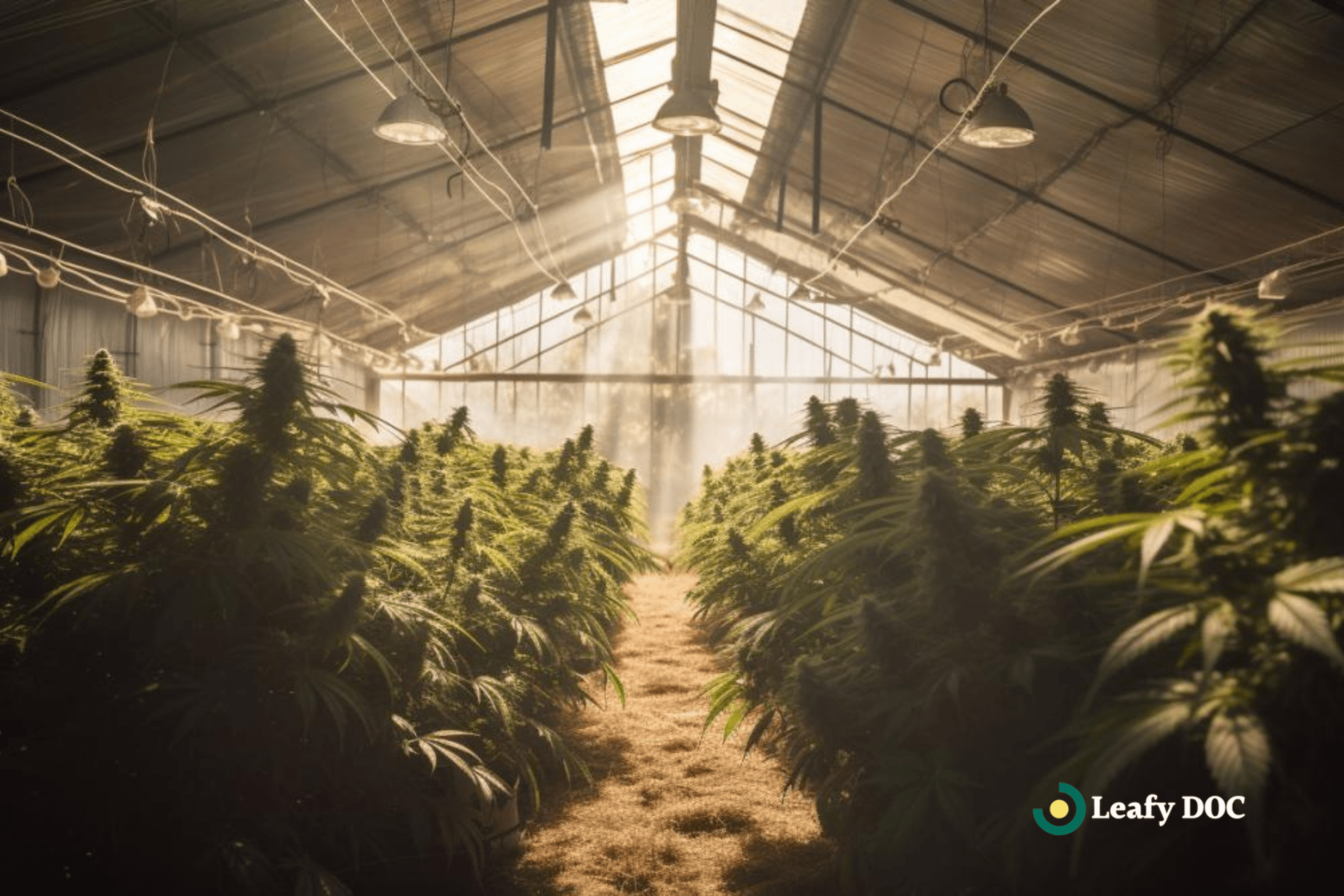Understanding The Effects Of Recreational Marijuana
by Haley Mills · May 30, 2024
Uncover the mind-blowing truth about the effects of recreational marijuana and prepare to be amazed! Click now to discover the surprising impact it can have on your mind and body. Don’t miss out on this eye-opening article.

While some may scoff at the idea of lighting up a joint or taking a hit from a bong, there’s a whole lot more to it than meets the eye. Recreational marijuana has a whole host of effects on your mind and body that you might not even be aware of.
Now, before we dive into the nitty-gritty, let’s talk about irony. You know, that little twist of fate that makes life oh-so-interesting? Well, it turns out that the effects of recreational marijuana are just dripping with irony. You see, while some people may view marijuana as a way to escape reality and find freedom, it has a way of playing with your mind in ways you might not expect.
Understanding these effects is the first step towards truly embracing the freedom that recreational marijuana can bring. So, get ready to explore the science behind marijuana’s psychoactive effects, the potential health benefits and risks, the impact on your mental health and cognitive functioning, as well as the social and legal implications of recreational marijuana.
Oh, and let’s not forget about the different methods of consumption and dosage because when it comes to recreational marijuana, there’s a whole smorgasbord of options to choose from. Trust me, my friend, by the end of this journey, you’ll have a newfound understanding of the effects of recreational marijuana, and you’ll be ready to embark on your path to freedom.
Key Takeaways
- Recreational marijuana has psychoactive effects on the mind and body, primarily due to the interaction of THC with cannabinoid receptors and the release of dopamine and other neurotransmitters.
- It can affect memory formation and cognitive functioning, so be aware of these potential side effects.
- While there are potential health benefits such as pain relief, improved sleep, and reduced anxiety and stress, there are also potential risks, including the development or exacerbation of mental health disorders and impaired cognitive functioning.
- The social and legal implications of recreational marijuana are complex and include changes in societal norms, economic growth, and the need for regulations and policies to govern its use.
The Science Behind Marijuana’s Psychoactive Effects
When you light up a joint or take a hit from a bong, the THC, or tetrahydrocannabinol, in marijuana enters your bloodstream and travels to your brain. Here, it interacts with specific cannabinoid receptors, which are found in areas of the brain responsible for pleasure, memory, coordination, and time perception. This interaction leads to the release of dopamine, a neurotransmitter often associated with euphoria and relaxation.
But that’s not all. The effects of marijuana go beyond just dopamine release. Research has shown that THC can also affect other neurotransmitters in the brain, such as serotonin and GABA, which play a role in mood regulation and anxiety. This is why some people experience feelings of happiness and calmness when using marijuana.
Additionally, THC can disrupt the normal functioning of the hippocampus, the part of the brain responsible for forming new memories. This is why marijuana users may have difficulty remembering things that happened while they were high.
So, the next time you light up, remember that there is a whole world of science behind the mind-altering effects of marijuana. From the release of dopamine to the disruption of memory formation, marijuana can have a profound impact on your brain.
It’s no wonder that so many people are drawn to its effects. But as with any substance, it’s essential to be aware of the potential risks and to use responsibly. After all, freedom is about making informed choices and taking control of your own experiences.
Health Benefits and Potential Risks of Recreational Marijuana Use
While the effects of marijuana may vary from person to person, there are several potential benefits that users have reported.
- Pain relief: Many individuals use marijuana as a natural alternative to traditional pain medications. It has been suggested that marijuana can help alleviate chronic pain by reducing inflammation and relaxing muscles. This can be particularly beneficial for those suffering from conditions such as arthritis or multiple sclerosis.
- Improved sleep: Marijuana has been known to help individuals with insomnia or other sleep disorders to fall asleep faster and stay asleep longer. It can also help reduce the frequency of nightmares and improve the overall quality of sleep.
- Reduced anxiety and stress: Marijuana has been reported to have a calming effect on the mind and body, which can help reduce feelings of anxiety and stress. This can be especially helpful for individuals who struggle with anxiety disorders or have high levels of stress in their daily lives.
Impact on Mental Health and Cognitive Functioning
One might be surprised by the potential impact of indulging in this popular pastime on our mental well-being and cognitive abilities.
While recreational marijuana may offer an escape from reality and a sense of freedom, it’s essential to consider the potential consequences it can have on our mental health and cognitive functioning.
For starters, frequent marijuana use has been linked to an increased risk of developing mental health disorders, such as anxiety and depression. It’s not uncommon for individuals to turn to marijuana as a way to cope with stress or escape from their problems. However, relying on this substance as a crutch can exacerbate these issues in the long run.
Instead of addressing the root causes of their mental health struggles, individuals may find themselves trapped in a cycle of dependence, where marijuana becomes their only source of relief.
Furthermore, recreational marijuana use can also harm cognitive functioning. Studies have shown frequent use can impair memory, attention, and decision-making skills. This can significantly affect various aspects of life, including work, relationships, and overall productivity.
While some individuals may argue that marijuana enhances their creativity or helps them think outside the box, it’s essential to recognize that these perceived benefits may come at a cost.
Social and Legal Implications of Recreational Marijuana
To fully grasp the social and legal implications of using recreational marijuana, you must consider the impact it has on communities and the potential changes in legislation. The legalization of recreational marijuana has sparked a significant shift in societal norms and attitudes toward cannabis use. It has brought about conversations surrounding personal freedoms, individual rights, and the role of government in regulating substances. Additionally, the legalization of recreational marijuana has also led to changes in legislation, with many states implementing regulations to govern its use and distribution.
One way to understand the social and legal implications of recreational marijuana is by examining its impact on communities. The use of marijuana can have both positive and negative effects on society. On one hand, it can contribute to increased tax revenue, job creation, and economic growth. Legalizing marijuana can also reduce the burden on the criminal justice system, freeing up resources to focus on more serious crimes. On the other hand, there are concerns about the potential negative consequences of marijuana use, such as impaired driving, increased youth access, and the potential for addiction. These concerns have led to the implementation of strict regulations and policies to mitigate these risks.
To give you a better understanding of the social and legal implications, let’s take a look at a table that highlights some key points:
| Social Implications | Legal Implications |
|---|---|
| Increased tax revenue and job creation | Implementation of strict regulations and policies |
| Economic growth | Impact on criminal justice system |
| Changes in societal norms and attitudes towards cannabis use | Potential changes in legislation |
| Reduction in the burden on the criminal justice system | Mitigation of risks such as impaired driving and increased youth access |
Exploring Different Methods of Consumption and Dosage
Curious to explore different methods of consumption and find the right dosage for you? Well, you’re in luck! There are a variety of ways to enjoy the benefits of recreational marijuana, and finding the suitable method and dosage can be an exciting journey of self-discovery.
Here are four popular methods to consider:
- Smoking: This classic method involves inhaling the smoke from burning marijuana flower. It offers fast-acting effects and allows you to control your dosage easily. Plus, there’s something undeniably freeing about taking a hit and feeling the relaxation wash over you.
- Vaping: If you’re looking for a healthier alternative to smoking, vaping might be the way to go. Vaporizers heat the marijuana flower or concentrate to release cannabinoids without the harmful toxins associated with combustion. It offers a discreet and convenient way to consume marijuana, giving you the freedom to enjoy it wherever you go.
- Edibles: For those who prefer a more gradual and long-lasting experience, edibles are a popular choice. These tasty treats come in various forms, like gummies, chocolates, and baked goods. However, be careful with the dosage as the effects can take longer to kick in, but once they do, it’s a whole new level of freedom and relaxation.
- Topicals: If you’re seeking the therapeutic benefits of marijuana without the psychoactive effects, topicals are worth exploring. These products come in the form of lotions, balms, and oils that can be applied directly to the skin. They offer localized relief for pain, inflammation, and other skin conditions, allowing you to experience the freedom of a pain-free body.
Frequently Asked Questions
What are the long-term effects of recreational marijuana use on physical health?
Long-term use of recreational marijuana can have various physical health effects. These may include respiratory issues, chronic bronchitis, and an increased risk of cardiovascular problems. Consider these risks when using marijuana.
Can recreational marijuana use lead to addiction?
Yes, recreational marijuana use has the potential to lead to addiction. While it may seem harmless, it’s a good idea to acknowledge the possibility of developing a dependence on it, which can hinder your desired freedom.
Are there any potential interactions between recreational marijuana and prescription medications?
Yes, there can be potential interactions between recreational marijuana and prescription medications. It is essential to consult your healthcare provider to understand how they may interact and ensure your safety and well-being.
How does the legalization of recreational marijuana impact crime rates in states where it is legal?
In states where recreational marijuana is legal, crime rates have plummeted like a skydiver with a faulty parachute. The legalization has unleashed a wave of freedom, reducing crime and making the streets safer.
What are the societal attitudes towards recreational marijuana use, and how have they changed over time?
Societal attitudes toward recreational marijuana use have significantly shifted over time. People are embracing the idea of personal freedom and seeing marijuana as a form of relaxation and stress relief. Its acceptance continues to grow.
Last Updated: August 8, 2024
Get Approved for Your Medical Marijuana Card in Minutes!

Get Your Medical Card
Connect with a licensed physician online in minutes

Like This Article?
Share with your friends
Table of Contents
Keep Reading
-
Navigate Your Medical Marijuanas Dispensary in NY: A Step-by-Step Guide
Explore essential tips for choosing a medical marijuanas dispensary in NY.
-
Comparing The Top Medical Marijuana Dispensaries In The US
Looking for the best medical marijuana dispensaries in the US? Check out our ultimate guide to discover top strains, prices, and services offered. Don’t miss out – click now and find your perfect dispensary!
-
How Long Does A Weed High Last
Find out the real duration of a weed high, from minutes to hours! Don’t miss this eye-opening article and satisfy your curiosity today. Click now to uncover the truth!



